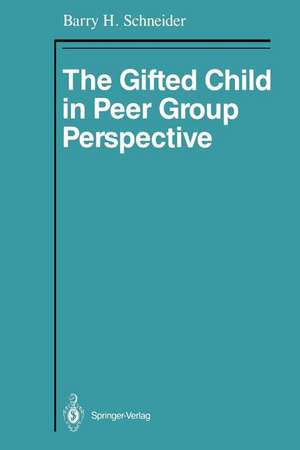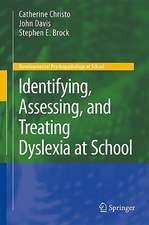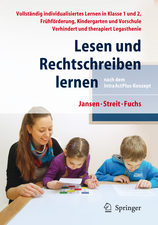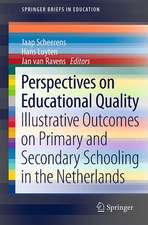The Gifted Child in Peer Group Perspective
Autor Barry H. Schneideren Limba Engleză Paperback – 24 oct 2011
Preț: 378.54 lei
Nou
Puncte Express: 568
Preț estimativ în valută:
72.44€ • 75.72$ • 61.21£
72.44€ • 75.72$ • 61.21£
Carte tipărită la comandă
Livrare economică 06-20 martie
Preluare comenzi: 021 569.72.76
Specificații
ISBN-13: 9781461387336
ISBN-10: 1461387337
Pagini: 128
Ilustrații: X, 115 p.
Dimensiuni: 155 x 235 x 7 mm
Greutate: 0.19 kg
Ediția:Softcover reprint of the original 1st ed. 1987
Editura: Springer
Colecția Springer
Locul publicării:New York, NY, United States
ISBN-10: 1461387337
Pagini: 128
Ilustrații: X, 115 p.
Dimensiuni: 155 x 235 x 7 mm
Greutate: 0.19 kg
Ediția:Softcover reprint of the original 1st ed. 1987
Editura: Springer
Colecția Springer
Locul publicării:New York, NY, United States
Public țintă
ResearchCuprins
1 Being Gifted in the Culture of Childhood.- The Gifted Child as Social Outcast.- The Pervasive Benign Light of Intelligence.- Intelligence, Leadership, and Role Differentiation in Small Groups.- Intelligence, Social Competence, and the Prediction of Adult Mental Health.- Motivation and Creativity in Peer Relations Perspective.- Role of the Peer Group.- Age Differences in the Social Adjustment of the Gifted.- Organization of this Book.- 2 Peer Acceptance of Gifted Children: The Pedestal Revisited.- The Challenge of Studying Peer Relations.- The Challenge of Studying the Gifted.- A Review of the Empirical Literature.- What Differentiates Popular and Unpopular Gifted Children?.- Conclusion.- 3 Early Peer Relations of the Eminent: A Pilot Exploration.- Method.- Quantitative Analysis.- Conclusions.- 4 The Portrayal of Brightness in Children’s Literature.- Development of Our Coding Manual.- Sampling Procedure.- Reliability of Ratings.- Quantitative Results: Portrayal of “Bright” Characters.- Qualitative Interpretation.- Conclusion.- 5 The Social Self-Concepts of Gifted Children: Delusions of Ungrandeur?.- One Self-Concept of Many?.- The Social Origin of Self-Concept.- Review of Self-Concept Studies.- Creativity and Self-Concept.- Conclusion.- 6 The Minority in Person: Gifted Children in Therapy.- David, Age 14.- Ellen, Age 15.- Jeffrey, Age 8.- Common Elements.- Counseling the Socially Maladjusted Gifted Child.- 7 School Life and the Social Development of the Gifted.- Evaluating the Impact of School Programming.- Research on the Impact of Schools.- Enhancing the Impact of Special Programs.- Author Index.















